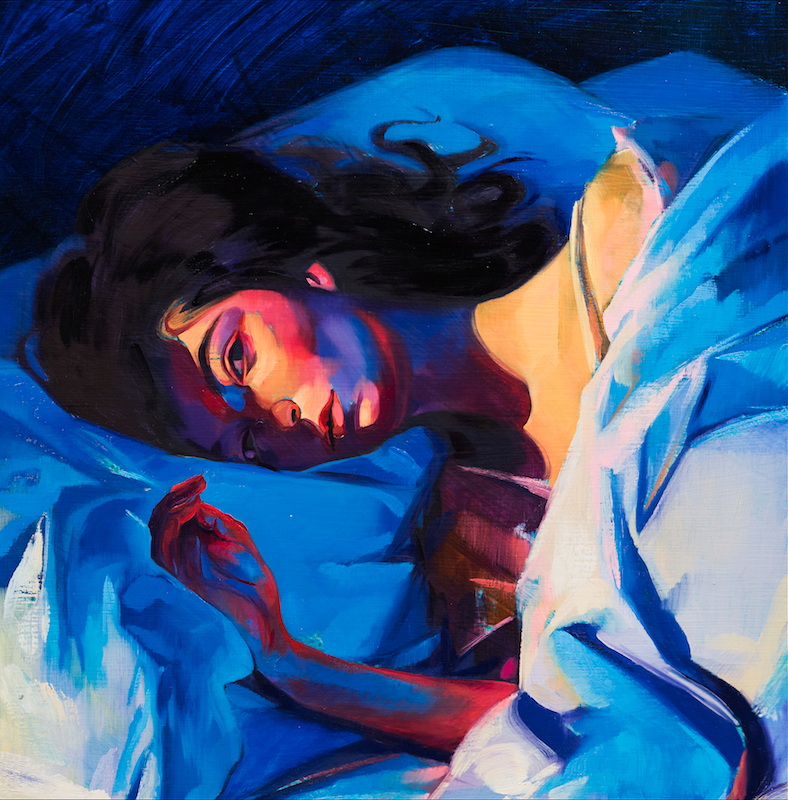Lorde’s Melodrama is still a defining album of our generation
Written by ABR on 15/06/2022
This article was originally published in June 2020. We are republishing it to mark the fifth anniversary of ‘Melodrama’.
It could be sunset or dawn: light creeping through the blinds, illuminating half of a young woman’s face as she lies in bed, dark hair strewn across a pillow. She looks towards us, as if she’s been stirred from her sleep, pulled from a bad dream into a reality that’s just as wild and brutal as what her subconscious mustered.
There is a lot of rumination going on inside the mind of Ella Yelich-O’Connor, known better as the artist Lorde. She is the young woman on the painting that adorns the cover of her 2017 sophomore record Melodrama: the epitome of juvenile sadness writ large, dissected and slotted back together again to form something tragic, gigantic and shaped by true feeling. What lies beyond that cover, in the 11 tracks that make up the Melodrama tracklist, is a sonic journey through heartbreak and growing up; paeans to being young and emotional. Three years after its release, it’s still, arguably, the most authentic and defining record of our generation.
“I constantly feel so blindsided by life, and so amazed and confused by it,” Lorde told us back in 2017. She was speaking shortly before the release of that record, one that would go on to top the Billboard Hot 100, earn her a Grammy nomination for Album of the Year, and, later, be widely cited as one of the greatest records of that decade by everybody from Pitchfork to Rolling Stone.

But measures of success, those sales and statues, are mere footnotes in what Melodrama means to those who listen to it. If you’re of a certain age — by that we mean born in the 1990s — and have experienced anything that Lorde has, be it loneliness, heartbreak or a sense of displacement, you’ll find yourself within those songs. Her emotions are distilled so potently into them that it’s become a hallmark of how we all, as a generation, feel at times: a go-to when you’re feeling low. Pressing play when you’re in a negative headspace, as we do so often, is a kin to pushing down hard on a yellow-blue bruise, to feel it all a little harder.
Modern existence can be brilliant and colourful and numbing all at once, and Lorde is perhaps the first artist of her generation to articulate this properly. On her debut record, 2013’s Pure Heroine, she explored small town suburbia, anxiety and boredom so distinctly that she was instantly framed as a prodigy. (At one point, a conspiracy theory existed that she was too smart to be a teenage girl; her birth certificate, released online shortly after, proved that theory wrong.) She was 16 when she wrote that record, known best for its hit single “Royals” but better represented through tracks like the modest and aching “Ribs”, and seemed to have spent so much time inside of her head that she’d solved the problems many like her were trying to find the answer for. Just 37 minutes in length, it was brief and to the point; a young woman staring outwards into a world begging to be explored but feeling deeply tied to home, as if stepping one foot out into it would change things.
And change they did: the time between Pure Heroine and Melodrama saw a three year relationship that had taken off just as fans started to know her name dissipated as work began on that second album. She was a star now — touted by David Bowie as “the future of music”, friends with Taylor Swift, lavished with praise by Kanye West — but none of that could overshadow that universal feeling of leaving someone you spent so much time with in your past. That isn’t necessarily negative though. She told The New York Times that Melodrama wasn’t a breakup album, but “a record about being alone. The good parts and the bad parts”.
Which is something this generation is both brilliant and terrible at doing, endlessly pulling ourselves out of throes of loneliness with a desire to be close to someone, then quickly rejecting that affection, confusing ourselves.
If Pure Heroine was a spontaneous homegrown pop record built on scarcity and intimacy, Melodrama amplifies and exacerbates those things, exploring a world greater than the one she ruminated upon the first time around. The first line sung on it, the first hint of her return that we heard was “I do my make-up in somebody else’s car” on “Green Light”, a girl on her way to a party. At the time, writing about heartbreak was unfamiliar to her. This was a song about drunkenly dancing through the first ‘Fuck you’ moments of that relationship. It speaks to everybody who, despite no longer being with someone they once (or still) loved, continue to know that person better than whoever might come after you.

Jack Antonoff, the album’s executive producer known for manifesting magic with others, like Lana Del Rey on Norman Fuckin’ Rockwell, can also count this as his masterpiece. Somehow both grandiose and taut, the semblance of dramatic string sections, melancholy keys (“Writer in the Dark”) and rumbling, gorgeous synths on a pop classic like “Supercut” make this powerful from a production standpoint. His approach to sonic storytelling, like Lorde’s buried a little deeper than many choose to dive into, is so perfectly constructed and unpredictable.
If records about solitude and shifting relationships tend to gloss over the small details of how that changes someone, Melodrama is our generation’s first album that appreciated those nuances. It is wise and yet vulnerable, often violent in its imagery. On “Homemade Dynamite”, even a rare moment of togetherness — a night out with friends — has a violent end: “Might get your friend to drive, but he can hardly see / We’ll end up painted on the road / Red and chrome / All the broken glass sparkling,” she sings, before shrugging that harmonious and colourful car crash off: “I guess we’re partying.”
Melodrama bleeds that semi-masochistic feeling. Of allowing yourself to be in love or happy, knowing the end will hurt anyway. “Bet you want to rip my heart out, bet you wanna skip my calls now,” she predicts on Loveless, the second, woozier half of a two-hander that’s preceded by the striking Hard Feelings, that’s followed by a frank admission: “Well guess what? I like that.” Perhaps what we feel drawn to is this sardonic take on something those before us took so seriously. Sure, Melodrama is dramatic (it’s in the title after all), but it also speaks to our generation’s desire to not take things so seriously stupid as fuck, laughing off a pain we feel stuck in. It’s a record for a generation who tweet memes about their depression, in an attempt, maybe, to manifest a cure somewhere out in the ether. But also just because it’s good to extol our emotions for working when they feel mute in daily life.
It’s no surprise that the album’s cult following remains strong some three years after its initial release. That people see it as an emotional refuge that may take them back to a time and place, while still allowing that meaning to evolve, moulding perfectly to situations in your life that have arisen since. For we spend so much time begging to feel something that even pain is a positive; a sign we’re still capable of feeling at all. Lorde’s sophomore record will always speak to that: “All the glamour, and the trauma and the fucking melodrama” of what it means to be young, bitter, brilliant and lonely all at once.



 ABR Group
ABR Group